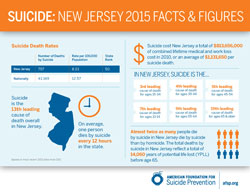A recent study released by USA Today highlighted how, while many campuses are pregressing, there is still a need for comprehensive mental healthcare on college campuses.
According to the statistics presented by the National Alliance on Mental Illness, one in four adults experience mental illness in a given year. Andrew Lee, director of Monmouth University’s Department of Counselling and Psychological Services, estimates that nearly all of the students he sees are dealing with anxiety, depression, or both.
“I haven’t run specific figures for last year or this year in terms of how many students might present with that issue,” he said. “At least most students coming in are presenting with either anxiety or depression, or both.”
According to the Anxiety and Depression Association of America (ADAA), anxiety disorders are one of the most common mental health problems on college campuses. Forty million U.S. adults have an anxiety disorder; 75 percent of them suffer their first anxiety episode by the age of 22.
In 2008, the Associated Press and mtvU organizations surveyed college students about their anxiety, and discovered that 80 percent of students said that they frequently or sometimes experience daily stress. 34 percent of students felt depressed at some point within the past three months, 13 percent have been formally diagnosed with anxiety or depression in the past year, and 9 percent have considered suicide in the past year.
According to the study published by USA Today, that number has stayed nearly the same, with one in 12 students (just over 8 percent) having made a suicide plan at some point during their college career. The survey also pointed out that 49.5 percent of students had felt hopeless in the past year. 60.5 percent of students had felt lonely in the past year; loneliness is often an early warning sign of depression.
 The increasing levels of mental health problems on campus may be attributed to the various stressors that students face on a daily basis.
The increasing levels of mental health problems on campus may be attributed to the various stressors that students face on a daily basis.
“I, in my role, see more anxiety than I see depression,” said Mary Anne Nagy, Vice President for Student Life and Leadership Engagement. “I’m not a clinician. Diagnosing depression is different than seeing students who are stressed and anxious. It’s a little easier for one to pick up on that in conversations with students. There’s no question that students have lots of demands on their time. Academically, socially, you’ve got work, you’ve got the pressure of all of that, and in between, you’ve got to eat, you’ve got to sleep, you’ve got to do your laundry.”
“And when you’re doing all those things and juggling twelve, fifteen, even eighteen credits sometimes, the demands of what I hope is a rigorous academic curriculum can lead to feeling pressure and stress, particularly around this time of year, when there’s anxiety around midterms,” Nagy added.
Depending on the year of education, different college students may face worries about different things. As their academic career continues, those issues can alter and change, shifting depending on the student.
“At every stage, there are different things that different students experience or suffer from,” said Lee. “For instance, a first-year student would have lots of transition issues. They’re coming in to a whole new environment, an experience that is unfamiliar to them. They’re dealing with the stress surrounding transitions, change, adjustment, and things along those lines,” she said.
“A second-year student might not come in with those same issues because they’ve already had that experience of being here… You deal with no longer being a first-year student, and often they perceive less support and focus, and they want to create their own niche, their own space, in the college community. In junior years, it’s about picking majors. There’s often anxiety around picking a major and figuring out the beginning stages of what you want to do for a career. As a senior, you have to think about your trajectory; there’s anxiety and stress about ‘what am I going to do after I’m done?’”
Monmouth University takes many proactive steps to help combat mental illness on campus. While two-thirds of those suffering from mental illness do not seek treatment, according to an assessment taken by the American College Health Association in spring 2015, the University makes that treatment available just in case.
The counselling center has both psychologists and licensed professional counselors, known as LPCs. The center is open year-round, even during summer sessions, and students can attend unlimited sessions free of charge. Health services employs substance counselors who can help students suffering from substance abuse, and those employed by health services are capable of doing a cursory mental health check when students come in for physical issues.
There is also a consulting psychiatrist available on campus, in case an illness is severe enough to warrant medicinal treatment. There is also a variety of programming and education on mental illness, and there are several De-Stress Fests held throughout the year to help students who may feel overwhelmed. There are also multiple hot lines available for multiple situations, and all residential life staff members are trained to help their residents when these services are not available.
The University is also recognized by the Jed Foundation, one of the leading non-profit organizations working to protect the emotional health of teenagers and college students, for providing comprehensive mental health promotion.
“I think they certainly do enough to help students,” said a sophomore student who wished to remain anonymous. “The only improvement I could suggest would be to maybe hold some programming in the dorms, maybe group programs about stress, just to make it more convenient for students. But overall, they do a good job.”
“Over the years, we’ve done a lot to focus on this area,” said Nagy. “It is a growing area of concern. I think campuses have to be realistic and be prepared to help support students who are struggling with mental illness, because with the right help and the right support and the right intervention and the right encouragement, everyone can be successful,” said Nagy.
“I always tell students, if you can get into Monmouth, you can graduate Monmouth. You might need a little extra help along the way, because, you know, life is overwhelming at times. Sometimes we all just need to have a little extra help and support.”
PHOTO COURTESY of Kiera Lann




